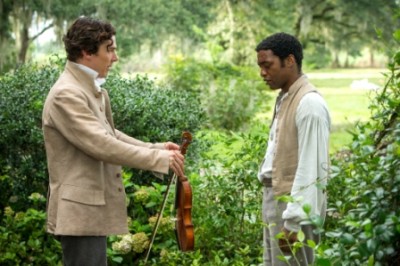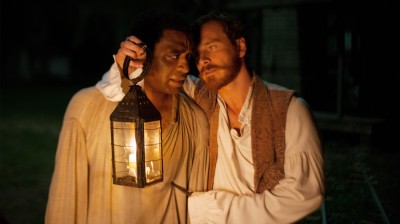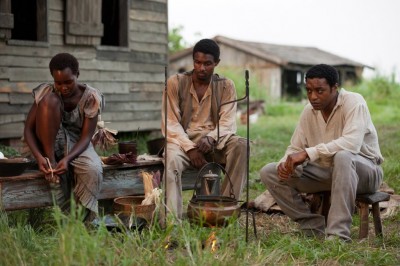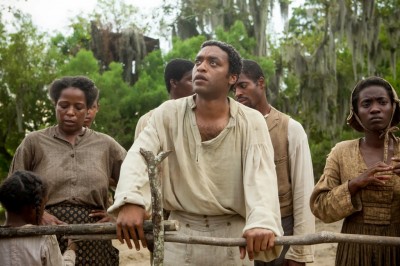
All in all, the praise you have almost certainly heard for Steve McQueen’s 12 Years a Slave — as well as the excellence of Chiwetel Ejiofor in the lead role — is deserved. This is a very good film. Possibly, it is a great one. It is beautifully made and stylish to no end — even elegant. With an assured hand, McQueen has captured the uncomfortable juxtaposition of natural beauty and unnatural ugliness. His images of a genteel Old South that ignores the very uncivilized events playing out in its midst — often just beyond the veranda railings — is disturbing in a way I have never seen in a film of this sort. I have nothing but praise for all this. It’s fine work. It’s powerful. It’s as disturbing as it was meant to be. And yet — why did I sit through it completely dry-eyed? Why was I not in tears by the end of it? I don’t know if the fault lies in me, or my mood at the time I saw it — or in the film. A second viewing will probably answer this for me, though I’m inclined to blame McQueen’s clinical approach to filmmaking (something that marred his 2011 film Shame). He sees and records powerfully, but he keeps his feelings close to his vest. That may be what keeps me from calling 12 Years a Slave a masterpiece, but I still think it’s close to one.

It recounts the fact-based tale of Solomon Northup (Ejiofor), a free, middle-class black man from Saratoga Springs, New York. He was duped into accompanying a pair of traveling showmen (Northup calls them “artists”) on a trip to Washington, D.C., with the promise of picking up some easy money as their violinist. Instead, they drug Northup and sell him into slavery that will send him to the Deep South — for 12 years of living hell. The film is drawn from Northup’s own account — co-written with a professional writer — and has the feel, at least, of authenticity. The unspeakable cruelties to which he is subjected are occasionally leavened (ever so slightly) by curious flashes of humanity. While we see none in the slave trader (Paul Giamatti) — ironically named Freeman — there is much apparent decency in Northup’s first “master,” Ford (Benedict Cumberbatch), though it’s mixed with the belief that it’s all right to own slaves and (more importantly) the fear of upsetting the status quo. Ford likes and admires Northup, but when Northup beats up a sadistic overseer (Paul Dano in a skin-crawling performance), it’s easier to sell Northup than deal with the consequences.

Ultimately, Northup will find himself on the worst plantation imaginable — owned by Edwin Epps (a mesmerizing Michael Fassbender). Epps is not merely cruel, he’s plainly psychotic. His actions rarely make sense, but they always seem believable in the context of the characterization of Epps as a madman. His wife (Sarah Paulson) is no better, but her ire is directed at Epps’ slave mistress, Patsey (TV actress Lupita Nyong’o). It’s a wholly poisonous environment — not helped by a few side-trips to a neighboring plantation where there is a black mistress (Alfre Woodard) who has risen from slavery to a position of power — she delights in having slaves tend to her every need. (She’s like something out of a Tod Browning jungle drama.) Everything in this world is twisted, ugly, dangerous and duplicitous — all the more so because of the physical beauty of the landscapes and the stately homes. The sole voice of reason is a builder named Bass (Brad Pitt), who openly despises slavery and freely espouses that it’s morally wrong — but even he is hesitant to help Northup, knowing that any such act would be dangerous to all concerned.

All of this is brilliantly achieved and powerful. McQueen’s depiction of the torments is unflinching — and it should be. The film is nothing if it doesn’t disturb you on a deep level. I expect to hear the usual arguments about the film being inflammatory. Well, it’s supposed to be. It’s clearly not worried about offending anyone’s sensibilities. And it shouldn’t be. (I also anticipate a certain amount of “slavery wasn’t like this” from some quarters, based on the depiction in Gone with the Wind.) But this is taken from a first-hand account, and it hews pretty closely to that account. See it for yourself. It is a must-see, though as one person asked at the screening I attended, “Do you really think that the people most in need of seeing this will?” Sadly, the answer is probably no. Rated R for violence/cruelty, some nudity and brief sexuality.
Playing at Carolina Cinemas




I felt like I was the only one in the theater that wasn’t bawling their eyes out. I’m not even entirely sure why, as I’ve found both of McQueen’s previous pictures, especially [i]Hunger[/i], to be incredibly moving.
Everything I got out of this was about what I expected. It’s certainly the most visceral of its kind, but I think it ends there for me. My main problem with it was that I found the enablers to be richer than any of the slaves. It ultimately left me with the feeling that McQueen, or the screenwriter, had this notion that we’d automatically feel bad for these people solely because they’re slaves, which in part is true, but the further I get back from it the more I wish there was something substantial to them. I don’t know, maybe it’s just me.
Ejiofor, Fassbender, and especially Nyong’o are all superb. Some of the other minor roles played by the A-listers was kind of a mixed bag. I think this is one of Brad Pitt’s worse performances.
I liked it enough, but I can’t imagine sitting through it again. I certainly don’t think it’s the best of the year, like some are loudly proclaiming.
Well, Pitt’s character is a kind of abolitionist ex machina. He comes in late and isn’t very nuanced — apart from his fearfulness about actually doing anything.
I still want to see it again to see if it was the film or me — or my mood. It’s not that I’ve suddenly become immune to cinematic emotionalism. I didn’t exactly cry, but I was on the point of it several times during About Time this morning. If I had tried to speak about it in any detail right afterwards, I probably would have cried.
Do I think 12 Years is the best film of the year? No, but I think it’s the most likely to get an Oscar as it. After all, there’s no real connection between the Best Picture award and the best picture — at least 99% of the time. However, of the titles I currently expect to see on that list for Best Picture, I lean toward it.
“I found the enablers to be richer than any of the slaves.”
Do you mean richer in character? If so, maybe this was intentional in order to point out the numbing and oppressive effect of slavery and the loss of hope it engenders.
An interesting take that kind of fits — especially when considering the way Ejiofor’s character finds himself inadvertently drawn into the spiritual singing of the other slaves. There’s also some dialogue to that effect.
If the story hadn’t been set into motion by a pair of conniving cartoon characters and then brought to resolution by another rough draft figure in Bass I think it would’ve come closer to that elusive masterpiece achievement. The remaining bulk of the film, those harrowing 12 years presented, is very effective and almost uniformly great.
I enjoyed the dramatic pace of the film and the way the story and content are augmented by McQueen’s deft and sometimes bold style. Yet all without calling undo attention to itself and keeping the human element front and center. Somehow he strikes a rhythm that propels the story forward, even while spending a good deal lingering, and he keeps this up for what basically constitutes the entirety of the film if you lopped of the first and final 10 minutes. Thankfully the shortcomings in the set up were partly alleviated by an early and welcome flashback device.
I’m not sure if Brad Pitt’s performance was sub-par or if it’s just the fact that at that point of the film his mere presence was a distraction. Maybe both, but I tend to lean toward the latter. I think a less recognizable personality maybe would’ve helped iron out a certain amount of discord between what seemed like relatively flat characterization relative to so much of what comes before.
Oh, and mean not to imply neither pride nor shame, but no tears over here either. The Patsey/Solomon embrace got about the closest.
I wasn’t bothered by the “cartoon characters,” though now that you mention it, they could be out of Pinocchio. I lean toward your latter feelings about Pitt, but I think the role is essentially close to unplayable.
I’m still bothered by my lack of tears. I at least welled-up three or four times in About Time, so my waterworks factor is not busted. The closest I came here, I think, was when Solomon sees his old friend ride up with the sheriff. And there was some resonance in him apologizing for his looks when he returns to his family, but neither quite did the trick for me.
Ironically, for a film that had music (Northum’s talent) at it’s core, there was almost no score, which would have helped greatly in soliciting an emotional response. I found the film’s background of silence (except for birds and cicadas) to be off-putting and was unable to promote any waterworks, unlike several of the more aged patrons present.
While the production (costumes, settings, etc.) were very authentic, I found the dialogue less so, especially between Northum and the slave who was separated from her children, was too proper rather than vernacular, kinda like how all of the aliens you meet in Star Trek and other TV sci-fi all seem to speak un-contracted stage English.
I also found Northum’s overall narrative about the cruelty of slavery (and the director’s adaptation) to be overly heavy-handed when compared to other accounts of antebellum slavery. I grant there was a spectrum of cruelty and beneficence in America’s shameful institution, and perhaps Northum was unlucky enough to have fallen victim to the worst.
But I suspect that, as an outspoken abolitionist, he more likely exaggerated many aspects of his experience for public consumption. Many historians have exposed Harriet Beecher Stowe in this respect, as she never experienced slavery yet wrote such specific and horrific narratives that she all but started the Civil War. In addition, while touring Scotland in the 1870s, she witnessed the Highland Clearances and its’ resulting evictions, poverty and diaspora and declared it progress. She was a talented fraud and a hypocrite, like many authors, but we all but beatify her as if she were a journalist.
I also expect that the horrors Northum experience were amplified by his own gentility and naivete. I think any free black in the 1850s would know better than to venture alone and with too strangers to Washington, DC, a city that lies deep within a slave state. I will give him credit for his strength of will to survive and hope for an eventual return to freedom.
Having said all of this, I think the end result of Northam’s (and Stowe’s) work justified any license taken, but I still think we need to take such narratives with a heavy grain of salt. And it was with such a grain in my mouth, plus the lack of a score, that I found this film to be emotionally ineffective and somewhat disappointing.
I don’t have any intention of getting into the “slavery wasn’t this bad” debate — other than to note that while Stowe (who is really a canard here, since she has nothing to do with this per se) wasn’t there, neither were you, nor I, nor, for that matter, the historians. (Deciding whose history is the real history is always subjective in itself after a certain point.) All movies of an historical nature should be taken with a certain amount of salt. But you have to include Gone with the Wind in that, too. For that matter, I’d suggest the same degree of seasoning be applied to every history book.
There actually is a score — a very percussive one — but the emotional scenes were only goosed with those annoying “emotive chords” that never get near actual music (oddly, these are common to Tyler Perry dramas).
I was surprised to learn that the score was composed by Hans Zimmer. The style sounded very much like Harry Escott’s in SHAME and I expected his or another unfamiliar name to appear.
To be honest, I don’t remember a thing about Shame‘s music.
At points the score sounded like it was trying to hard to do Johnny Greenwood.